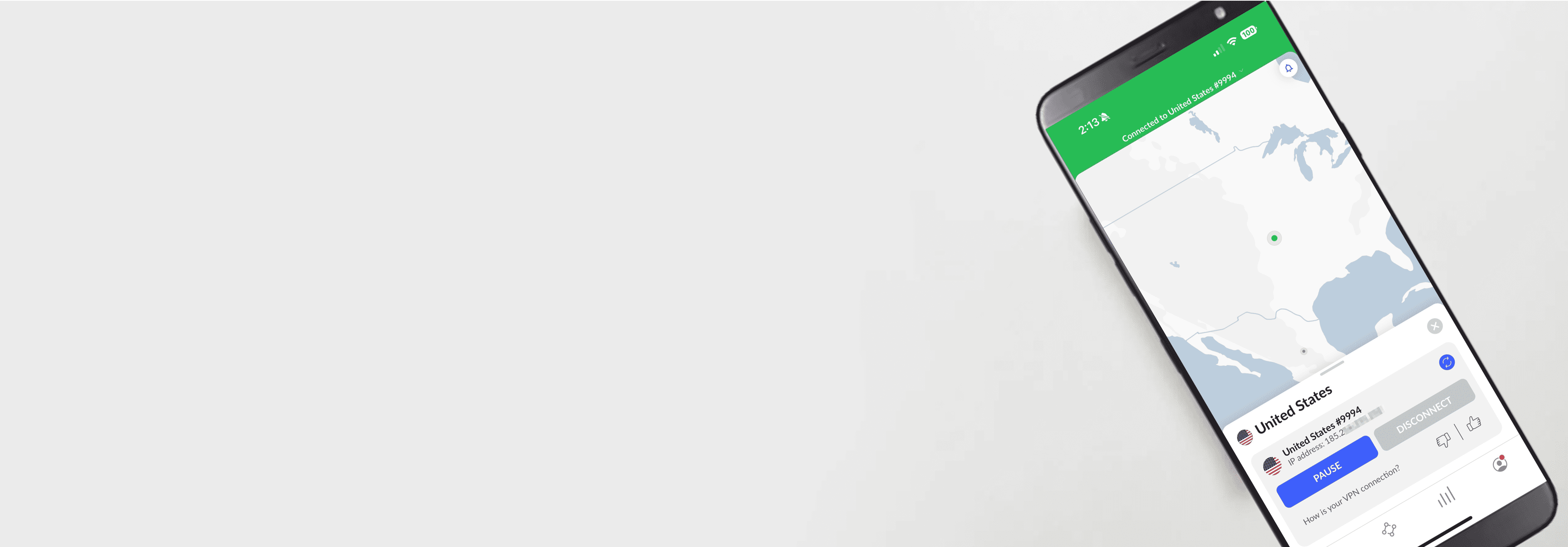VPNs, or virtual private networks, route your internet connection to a remote server via an encrypted tunnel. That means you’re always protected. No one can see what you’re up to; no one can access your personal data or any other information about you or your online activities. As a bonus, a VPN conceals your IP address behind an anonymous IP address, so you can browse without worrying who might be tracking your online movements.
I’ve spent years working with and testing the industry’s leading VPNs to get a sense of exactly how well they work and make recommendations for our readership. One thing I can tell you, if you’re using one of the best VPNs in the industry today, you’re going to be head-and-shoulders more secure than the people who aren’t. And in a world where identity theft runs rampant, you need every available advantage to stay ahead of the bad guys.
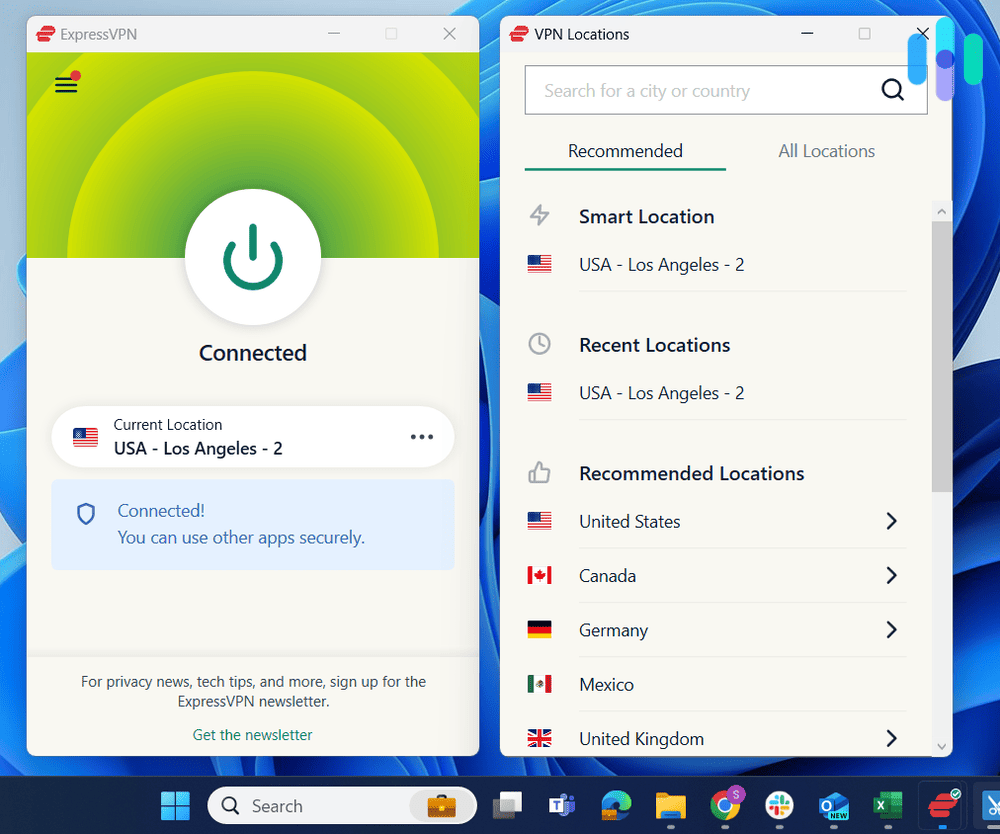
What is a VPN App?
A VPN’s app is its control center. You use it to connect to the VPN, to choose which servers you want to log on to, and to adjust settings. It’s the user interface that lets you control your VPN.
Of course, there are as many different VPN apps out there as there are VPNs. Some come with a kill switch that shuts down your online activities any time the VPN fails. Others offer split tunneling, which lets you split your internet connection so you can stay logged on to the regular internet at the same time you’re logged on to the VPN. Some select the best server for you. Others let you control decisions like that. In fact, we’ll let you in on a little secret. A VPN’s app can actually tell you quite a lot about the VPN service itself. Certainly, you never want to choose a VPN with a confusing app.
FYI: FYI: We always recommend testing your VPN before relying on it to keep your internet activities private. You can test to make sure it’s masking your IP address properly and not leaking any identifying information. Learn how in our guide to testing VPNs.
So, let’s dive just a little deeper into the world of the VPN app. How do these apps work? What can you do with them? And what do they reveal about the services they represent?
The VPN App
Let’s talk about what a VPN app actually does, starting with its basic function: protecting you when you’re online.
Once you install a VPN app on your device, you can use it to connect to a secure server through an encrypted tunnel. Most VPN apps allow you to do this with a click of a button. With NordVPN, for example, you simply open the app and click the Quick Connect button. The app makes decisions for you, like choosing the best server for your situation and deciding on the right protocol.
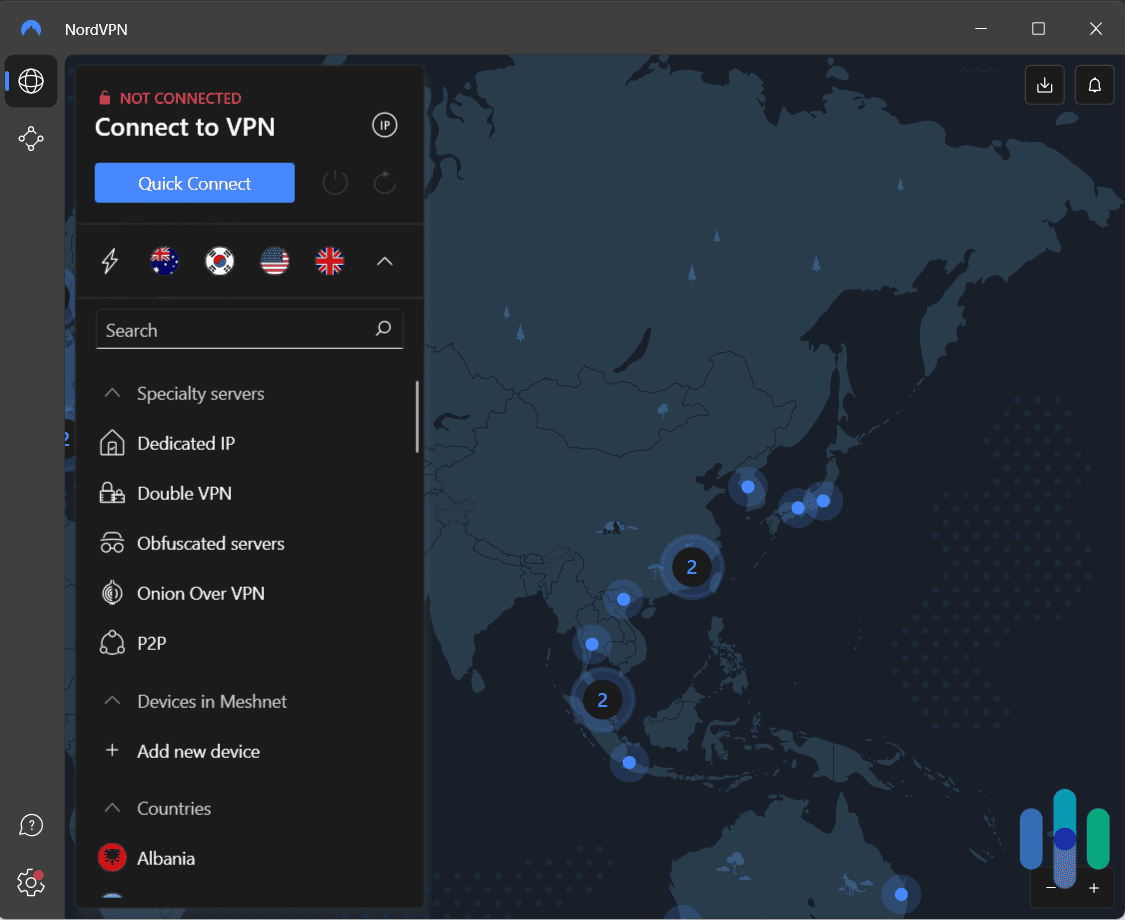
>> Check It Out: NordVPN review
A Quick Connect button is all well and good, but your VPN should give you the option to exert a little more control over its features if you want. You might prefer to choose which protocol you’re using, for example. Most VPN apps offer several options here. OpenVPN gives you maximum safety, for instance. On the other hand, maybe you’re willing to sacrifice a little security for a faster connection, depending on how you’re using your VPN today. In that case, WireGuard is a good option.
Likewise, you should be able to choose the server you want. If you’re looking to access Netflix content that’s available only in Germany, for instance, you’ll want to connect to a German server. Most VPN apps also let you choose the server with the lightest traffic so you get a faster connection.
>> Read More: Best VPNs for Germany
Our Favorite VPN Apps
The VPN app can make or break a VPN, so it’s important to choose a VPN with a reliable app. In that regard, these are the VPNs we tested with the best apps for smartphone and desktop:



Many VPN apps come with additional features that provide even more security and productivity.
- Kill switch: A kill switch shuts down your browser if you should lose your VPN connection. That way, no one can see what you’re up to, even accidentally.
- Split tunneling: If your VPN app has a split tunneling feature, you can log on to the regular internet at the same time you’re logged on to the VPN. We use it at the corner coffee shop when we’re working from home. We connect to the office through the VPN, but we stream our Spotify tunes through the coffee shop’s Wi-Fi.
- Multihop: The best VPNs offer multihop technology. When you turn on this feature, your connection is routed through at least two servers. Multiple hops means multiple encryption, increasing your security exponentially.
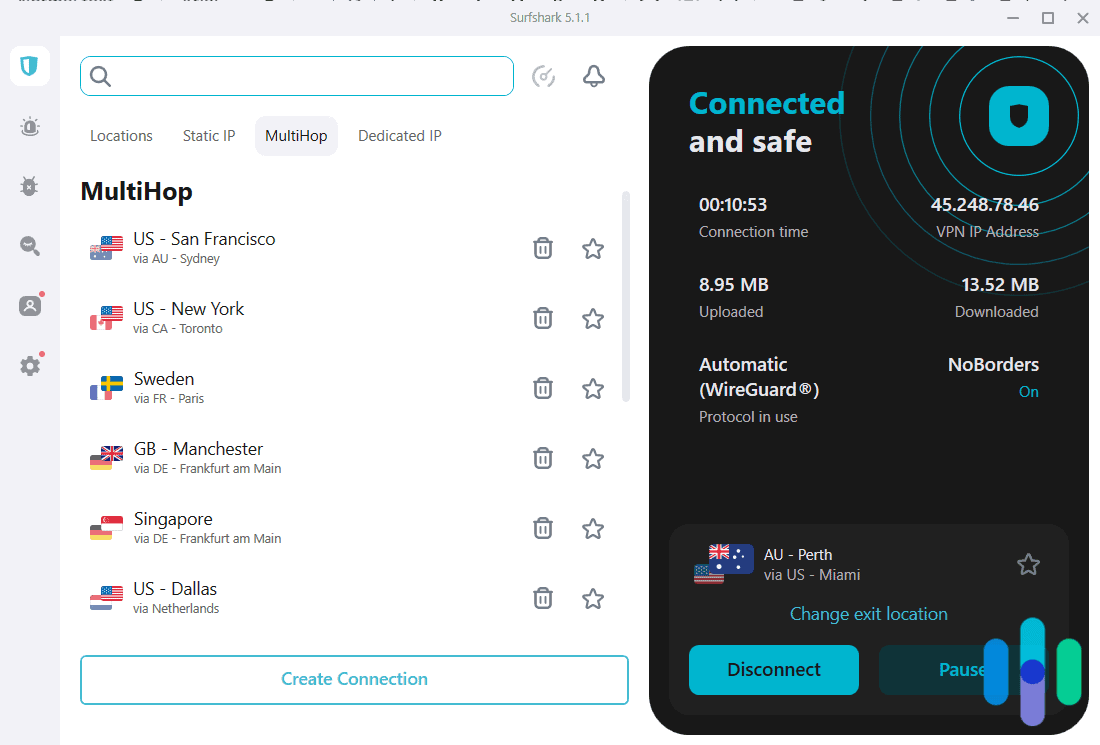
- Camouflage mode: Many VPNs have begun offering access to what are known as obfuscated servers. When you’re connected to one of these servers, no one can tell you’re using a VPN.
- P2P configured servers: If you’re into torrenting, you might want to look for a VPN that offers P2P configured servers. These VPNs make it easy to connect to torrenting sites. Again, your VPN app should let you choose exactly which server is right for your particular needs.
Most VPN apps let you make these adjustments any time you open them. You should also be able to change the settings, though, so that those Quick Connect buttons know all your favorites. We have our VPN configured to use the WireGuard protocol every time, for example. OpenVPN is a little more secure, but we’re not sending national secrets back and forth through our connection. And we can always switch back to OpenVPN whenever, you know, we’re working our side job with the CIA.
Setting Up a VPN App
You don’t necessarily have to use an app to gain access to a VPN. There are ways to manually install a VPN on your device. Installing your VPN through an app, though, is infinitely easier. Don’t believe us? Compare the processes.
Android
Here’s what you have to go through to get a VPN onto an Android device:
- First, you’ll need to sign up with a VPN. That involves navigating to your chosen VPN’s website and signing up for a subscription.
- Once you’ve signed up for a subscription, the VPN should give you a set of information you’ll need to set up the VPN on your device: a username, a password, a server address.
- Next, open the Settings app on your phone.
- Navigate to your Network & Internet settings.
- Navigate to VPN setup. You may need to enter Advanced features to access this screen.
- Choose Add a VPN.
- Enter the required information (username, password, server address, etc.).
- Choose Save.
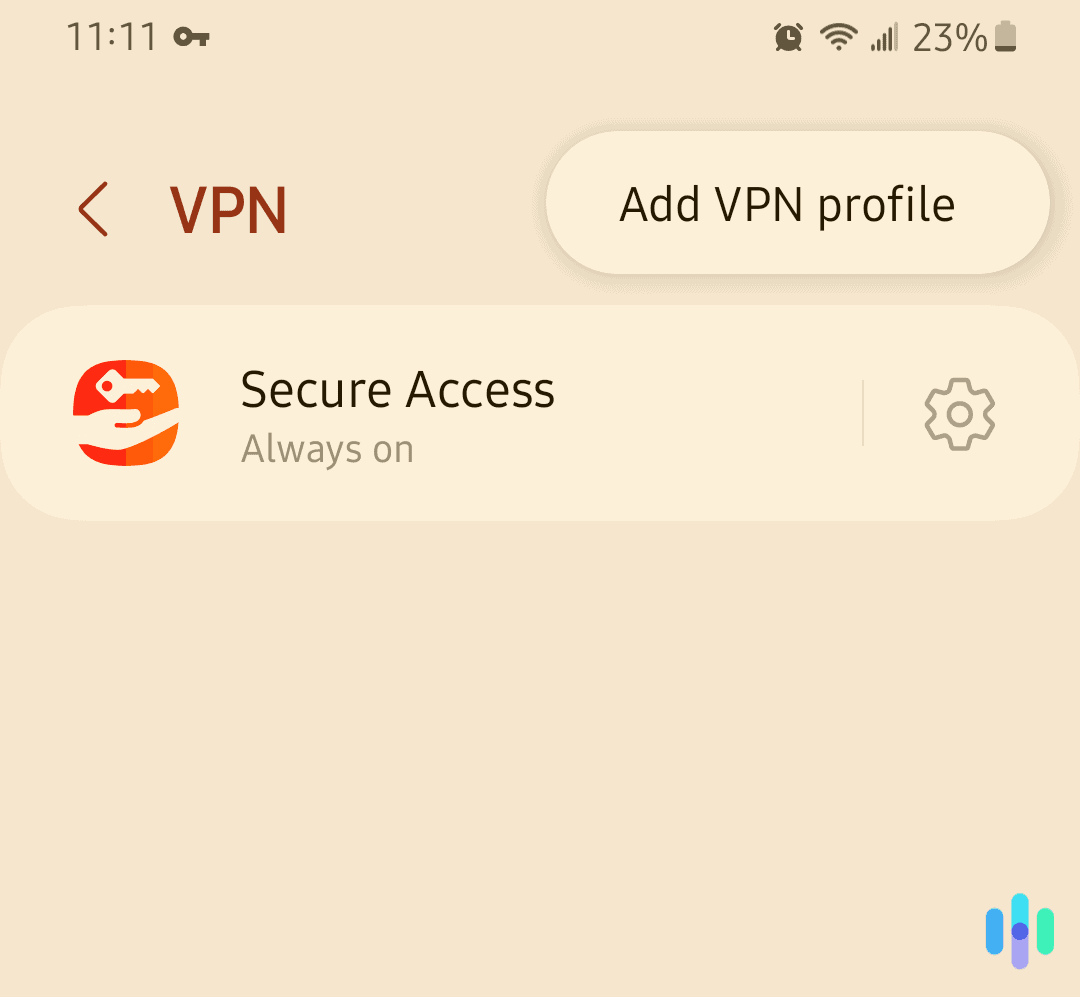
Each time you connect to the VPN, you’ll need to do so manually:
- Return to the Settings app.
- Return to the Network & Internet settings.
- Choose Advanced.
- Choose VPN.
- Select the VPN you want you’ve set up.
- Enter your username and password.
- Choose the server you want to connect to.
- Choose Connect.
It’s a similar process doing a manual install on any other type of device: Windows devices, Macs, and iPhones.
>> Find Out More: Best VPNs for Android
If you’re using a desktop or laptop, you’ll need to download the app from the VPN’s website rather than Google Play or the App Store, but the process works the same and is just as easy. Hooray for apps!
iOS
Here’s how to install a VPN on an iPhone:
- Using your Safari browser, download the VPN configuration file from your chosen VPN.
- Close the Profile Downloaded pop-up.
- Under your device’s settings, navigate to General.
- Navigate to Profile.
- Choose the name of your VPN.
- Choose Install and enter your device passcode.
- When a warning pops up, choose Install.
- When installation is complete, choose Done.
- To connect to a VPN, return to Settings.
- Navigate to General.
- Choose VPN.
- In the VPN menu, select a server and move the toggle to On.
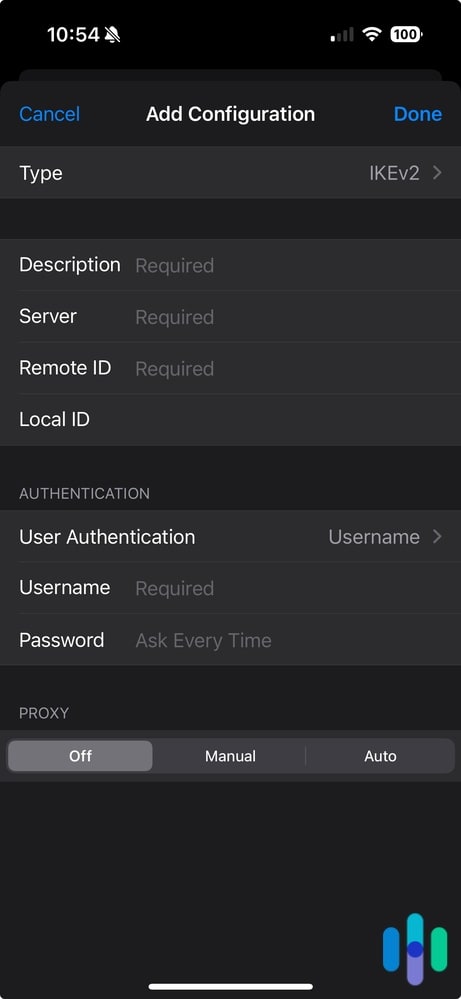
>> Check Out: Top VPNs for iPhone
Choosing the Right VPN App
There are dozens of VPNs out there, and while there are plenty of duds, there are also a fair number of really great services that offer great security for a reasonable price. How do you choose between them?
First, you should consider our complete guide to VPNs, which will help you decide which features are right for you. The fact is, every person is different, and what you need in a VPN will be different from what others may need from theirs.
You can learn a lot about a VPN, though, simply by considering its app features. Here are a few questions to consider when you’re browsing for a VPN app.
- How much control do you want? If you’re fairly new to VPNs, you might want to consider one with an app that does the choosing for you. You may not be sophisticated enough yet to know which servers are best. You may not know the difference between OpenVPN, WireGuard, and Lightway protocols. That’s OK. These VPNs will take care of you. On the other hand, if you have some very precise places you want to go and things you want to do, you want an app that gives you as much control as possible.
- How much security do you need? If you’re someone who’s dealing in sensitive information, you need as many security features as you can get. You want to make sure your VPN app lets you choose the OpenVPN protocol. You want a kill switch. And ideally, you want the option to use multihop and to log on to obfuscated servers.
- What features are you seeking? How do you plan to use your VPN? Are you traveling to countries where VPNs are banned and looking to stay safe? Or are you more interested in accessing streaming services in other countries? If you’re trying to keep Kim Jong Un from arresting you, security is probably your chief concern. If, on the other hand, you’re looking to download a hard-to-find Mexican sitcom, you’ll probably want a VPN with lots of servers in Mexico and fast speeds.
- What’s the right price for you? There are plenty of affordable VPNs out there, enough so you shouldn’t have to sacrifice quality for affordability. Of course, if you’re looking for a VPN with top-of-the line security features, you may have to pay a little extra. ExpressVPN can be a little pricey, for instance, at $12.95 for a single month. But you get all the latest safety technology, like multihop and camouflage mode. Most VPNs provide deep discounts if you sign up for long-term subscriptions. A single month of Ivacy, for example, costs $9.95. If you’re willing to commit to five years of the service, though, you pay just $60. That’s $1 per month.
>> Digging Deeper: Best VPNs for Netflix
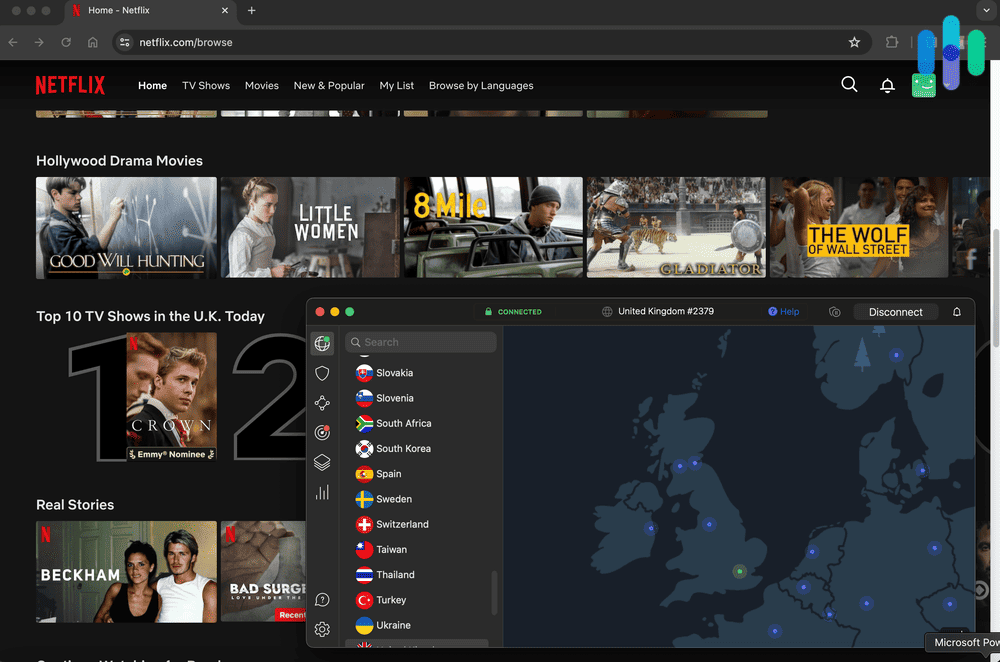
The Bottom Line
How did that commercial from 20 years or so ago go? Whatever you want to do, there’s an app for that! Boy has that turned out to be true. There are apps that identify birds by their songs, apps that monitor your sleep and wake you up at the perfect moment in your sleep cycle, apps for meditation, and apps for fitness.
There may be no more important app on your device, though, than your VPN app. Different VPN apps do different things, and they reveal a lot about the VPN itself. Ultimately, your VPN app lets you connect to the internet through an encrypted tunnel. It lets you conceal your actual IP address behind an anonymous, untraceable address. Bottom line: It keeps you safe. And there’s really nothing more valuable than that.
FAQ
Are you a technology junkie? Are you saying to yourself, OK, that was a lot of information about VPN apps, but I still have questions? Have no fear: We’ve put together a list of the questions we get asked more frequently, along with our answers.
-
Can you be tracked if you use a VPN?
You can be tracked through some VPNs but not through others. Assuming they don’t have any leaks, all VPNs encrypt your data so hackers can’t track you. However, the government could potentially track you if your VPN is headquartered in one of the Five Eyes, Nine Eyes, or 14 Eyes surveillance countries. If that’s a concern, look for VPNs that don’t log IP addresses, online activity, or time stamps. That way, the government will have nothing to track you with.
-
Should I have a VPN on all the time?
You should have your VPN on all the time if security and privacy are important to you. Your IP address and data are encrypted only when it is on. That said, leaving your VPN on all the time will result in slower connection speeds. If speed is important, you may prefer to switch back and forth between a VPN and the regular internet. Finally, some VPNs limit how much data you can use each month. In this case, it might also be advantageous to turn a VPN on and off as necessary.
-
What are the disadvantages of a VPN?
The primary disadvantage of a VPN is slower internet connections. In addition, most VPNs charge for their services, whether the fee is monthly, yearly, or more. Of course, specific VPNs may have their own individual disadvantages, and it’s always important to consider these before you sign up for a subscription.
- Inability to access blocked sites
- Shared IP addresses
- No split tunneling
- No multihop
- Inability to access certain streaming services
-
Are VPNs legal?
Using a VPN is not illegal in the United States, though breaking the law while logged on to a VPN is still breaking the law. In addition, some countries, including Russia, China, Iran, Iraq, and Turkey, have outlawed or severely limited VPN usage.
-
What is the best VPN app?
NordVPN offers the best VPN app. When considering a VPN app, you want to consider what the VPN itself can and can’t do. No VPN is more secure than NordVPN. It provides AES-256 encryption, a choice between OpenVPN and WireGuard protocols, a kill switch, and the option to use multihop. As a bonus, you can use camouflage mode to get past virtually all streaming service blocks. And, with prices as low as $2.99 per month, it’s affordable. Plus, the app is intuitive and lets you decide just how much you want to be in control of the VPN’s settings.
